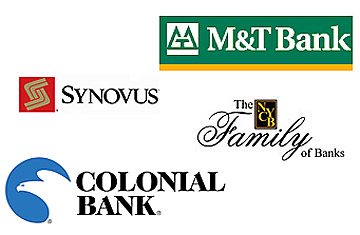
Several of the nation's largest banks have yet to announce that they have been approved for TARP assistance
The Treasury Department's efforts to stabilize the financial system may push a number of banks out of business. In the past few weeks, as many as 67 financial firms have received a portion of the $700 billion bailout approved by Congress. But absent from the list of companies approved for the government's Troubled Asset Relief Program (TARP) are a handful of midsize banks, which rank among the 50 largest in the nation by the Federal Reserve. And that has a number of analysts and investors who follow these companies worried. "It's a case of be careful what you wish for," says Thomas Brown, whose hedge fund Second Curve Capital specializes in financial firms. "We asked for the $700 billion, and we asked for capital purchases of bank shares. Now we have a case where if banks don't get approved for this money, they may not be able to stay in business."
Analysts are concerned that the vote of no confidence from the government would cause consumers to flee the banks, taking deposits and forcing the firms to liquidate or be sold. Among the nation's largest banks that have not yet announced they have been approved for the government's TARP assistance are Synovus Financial Corp, M&T Bank, New York Community Bancorp, Colonial Bancgroup and the South Financial Group.
"If a bank has not received TARP funds, it means one of two things," says Michael Levine, a portfolio manager at OppenheimerFunds. "Either you are strong enough that you don't need the funds, or, two, you are screwed."
Banks still have time to be approved for the TARP program. Applications for the program are officially not due until Nov. 14. And the Treasury Department has confirmed only a few of its investments. Moreover, taking government funds will force the firms to restrict executive compensation as well as make it tougher for them to increase their stock dividend. So some banks may pass. On Wednesday, officials of the Bank of Oklahoma said they would not tap the TARP program, adding that the bank was well capitalized on its own.
But dozens of large and small banks have already announced that they have received or expect to receive a capital infusion from the $700 billion bailout fund. Nearly a third of the fund has already been spent, and Treasury Secretary Henry Paulson said on Wednesday that he would like to use some of the remaining money to support the ailing market for such consumer debts as credit cards and college loans, as well as to prevent foreclosures. That leaves a dwindling fund left for the hundreds of banks still hoping to get TARP funds. Analysts and investors are growing concerned that some banks will be left out.
"There are a handful of midsize banks that a lot of investors feel like we should have heard from by now about TARP," says Kevin Fitzsimmons, a bank analyst at investment firm Sandler O'Neill. "But we haven't, and there is a growing sense of unease about it."
Shares of Colonial had fallen as low as $1.44, plunging 46% in a week, on fears the firm wouldn't qualify for government assistance. On Thursday, though, the firm said it had applied to receive TARP funds. The company's shares rallied on the news to a recent $1.98. Colonial, based in Montgomery, Ala., is one of the nation's largest regional banks, with more than 340 branches in Alabama, Florida, Georgia, Nevada and Texas, and $16.8 billion in customers' deposits.
Colonial made a lot of loans in the past few years to residential builders, particularly in Florida, many of which have now gone bad. As of the end of September, Colonial had $678 million in so-called nonperforming loans, which means the borrower is no longer paying interest. Fitch Ratings recently downgraded the bank to a credit rating of BBB-, which puts Colonial's debt just above junk. "From an overall capital perspective, they are all right, but Colonial is exposed to residential construction in problematic markets," says Fitch analyst Ken Ritz. "The risk profile of the company's loans is problematic." Synovus, which executives of the bank say has applied for funds but has not yet been approved, has also been hard hit by the real estate downturn. The bank, based in Columbus, Ga., with 34 branches and 440 ATMs in Georgia, Alabama, South Carolina, Florida and Tennessee, had a loss of $40 million in the third quarter. Synovus made $135 million in the same quarter a year ago. Its shares have fallen 40% in the past year, to a recent $6.89.
M&T Bank and New York Community Bank have both made money in the past year and are probably examples of financial firms that may not need assistance from the government. Still, observers say the consensus among bank executives is that the TARP program is a good deal. So any firm that decides to opt out may raise concerns among investors and customers.
H. Rodgin Cohen, a top banking lawyer at Sullivan & Cromwell, says being approved for TARP funds is do or die for any bank perceived to have problems. "The consequences are unmistakable, and I don't think we should blink at them," Cohen told the attendees of a banking-industry conference earlier this month. "It is failure within maybe a day, maybe a couple of days. It's hard for me to see how a bank survives if the regulators have said it is not sufficiently viable to be in these [federal assistance] programs."
